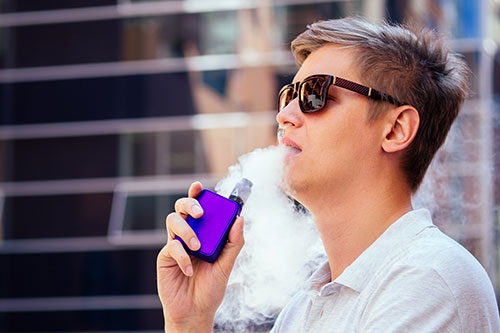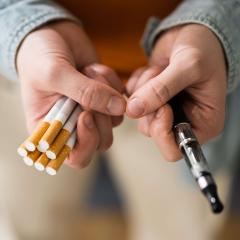We all know that smoking wreaks havoc on your smile. Smoking tobacco can yellow and loosen teeth, and lead to bad breath. Not to mention, it stands as one of key players behind mouth cancer.
Now, enter vaping—the generally perceived "healthier" alternative to smoking. But that’s only if you are already a tobacco smoker, and are looking to quit. So here's the burning question: As an alternative to traditional smoking, does vaping fare better for your teeth and gums?
Let’s find out.
Does vaping cause gum disease?
The most significant effect of vaping on gums is the increased risk of gum disease.
Vaping nicotine-containing products enhances gum disease by reducing blood flow, reinforcing our ‘fighter immune cell’ activity to destroy the tissues that hold our teeth in our jaw, and reduces our ability to heal.
Does vaping make your teeth yellow?
Flavoured liquids and nicotine used in vapes often include colouring agents that can contribute to a yellow or brown appearance of teeth, impacting both your smile and confidence.
In theory, vaping is expected to stain your teeth less than smoking because cigarettes layer tar, ash, and nicotine to coat teeth yellow and brown. Nicotine vapour, on the other hand, lacks tar and ash but still contains nicotine.
Although nicotine itself is colourless, prolonged exposure to nicotine in the mouth can yellow tooth surfaces. Additionally, the nicotine concentrations in vaping liquids can vary considerably. For instance, if you average ten puffs per session fifteen times daily, you may use-up a cartridge every two days. That equates to smoking the equivalent amount of nicotine from nearly three cigarette packets!
Does vaping give you bad breath?
 Bad breath is socially embarrassing yet difficult to self-diagnose, and can indicate other oral hygiene issues like cavities (holes in teeth), gum disease, or even infections in your mouth. A key cause of bad breath is a dry mouth. And yes, those who vape report mouth dryness as a common side-effect. The drying effects of propylene glycol and glycerol, common ingredients in vape liquids, cause a sensation known as ‘throat hit’. This drying effect reduces saliva production, which is crucial for maintaining oral cleanliness and health. Insufficient saliva reduces the washing-effect in our mouth to allow cavity and gum disease-promoting bacteria to accumulate in the mouth, resulting in bad breath.
Bad breath is socially embarrassing yet difficult to self-diagnose, and can indicate other oral hygiene issues like cavities (holes in teeth), gum disease, or even infections in your mouth. A key cause of bad breath is a dry mouth. And yes, those who vape report mouth dryness as a common side-effect. The drying effects of propylene glycol and glycerol, common ingredients in vape liquids, cause a sensation known as ‘throat hit’. This drying effect reduces saliva production, which is crucial for maintaining oral cleanliness and health. Insufficient saliva reduces the washing-effect in our mouth to allow cavity and gum disease-promoting bacteria to accumulate in the mouth, resulting in bad breath.
Fact - Did you know that propylene glycol is used as a heat transfer fluid in the air-conditioning industry, and in fog machines. And, glycerol is a cheap raw by-product material from the production of biodiesel.
Does vaping cause teeth cavities?
Yes, vaping can contribute to the development of cavities in teeth. How? Cavities are typically caused by the mineral in your teeth dissolving to neutralise the acid by-products of sugar devouring plaque bacteria (plaque sewage). If you use a sweet-flavoured vape, its likely to contain sugar, and continuous exposure to sugar-rich vapour provides a constant supply of fuel for the acid-producing bacteria.
Acids are also a by-product of propylene glycol, the main ingredient in vaping liquids that dissolves the mineral in teeth and dries the mouth. Glycerol increases the stickiness of bacteria and sugar to the tooth surface to accelerate cavity formation in your teeth. Increased stickiness allows the plaque bacteria to latch on to your teeth and makes it more difficult to brush clean.
Are there any other ways that vaping can damage teeth or gums?
- The lithium-ion batteries used to power vapes have been linked to explosions causing damage to teeth, gums and jaw bones.
- Vaping can cause irritation in the mouth, which can lead to the development of mouth sores including thrush (candida infections) in the mouth. These sores can be painful and unattractive and may make it difficult to eat or speak.
- Nicotine is a stimulant and can promote tooth grinding. Frequent grinding can crack and shorten your teeth, cause your jaw to lock and promote headaches.
- Oral microbiome caused by the shift from good healthy bacteria in your mouth to bad (pathogenic bacterial) imbalances associated with vaping have been linked to oral cancer.
- Compared to the research on traditional cigarette smoking (>50 years), studies on the effects of vaping is still new (less than 2 years). But studies conducted in controlled lab conditions show disease-causing changes at the cellular-level. And this is often an indicator for how vaping can affect your health in the long-term.
As a vaper, is there anything I can do to prevent damage to my teeth and gums?
Taking steps to safeguard your teeth and gums is crucial in preventing dental issues and gum disease. Make it a priority to schedule regular visits to your dentist, who can provide guidance on maintaining optimal oral health and conduct routine checks for mouth cancer. It's also beneficial to consult with your doctor or dentist about options for quitting vaping, as this can significantly contribute to preserving your oral well-being.
Returning to our initial question, 'Is vaping a safer alternative to smoking cigarettes?’, The concise response is: most likely not. Although research the effects of vaping on oral health is still in its infancy, evidence from laboratory studies and self-reported data suggests that we can anticipate a rise in vaping-related illnesses in the future. So the decision ultimately rests on you, and on how much you value your smile, your health, and your autonomy.
 AUTHOR: Dr Arosha Weerakoon is a dentist, lecturer who holds a PhD (2023) from the School of Dentistry, University of Queensland (UQ).
AUTHOR: Dr Arosha Weerakoon is a dentist, lecturer who holds a PhD (2023) from the School of Dentistry, University of Queensland (UQ).




